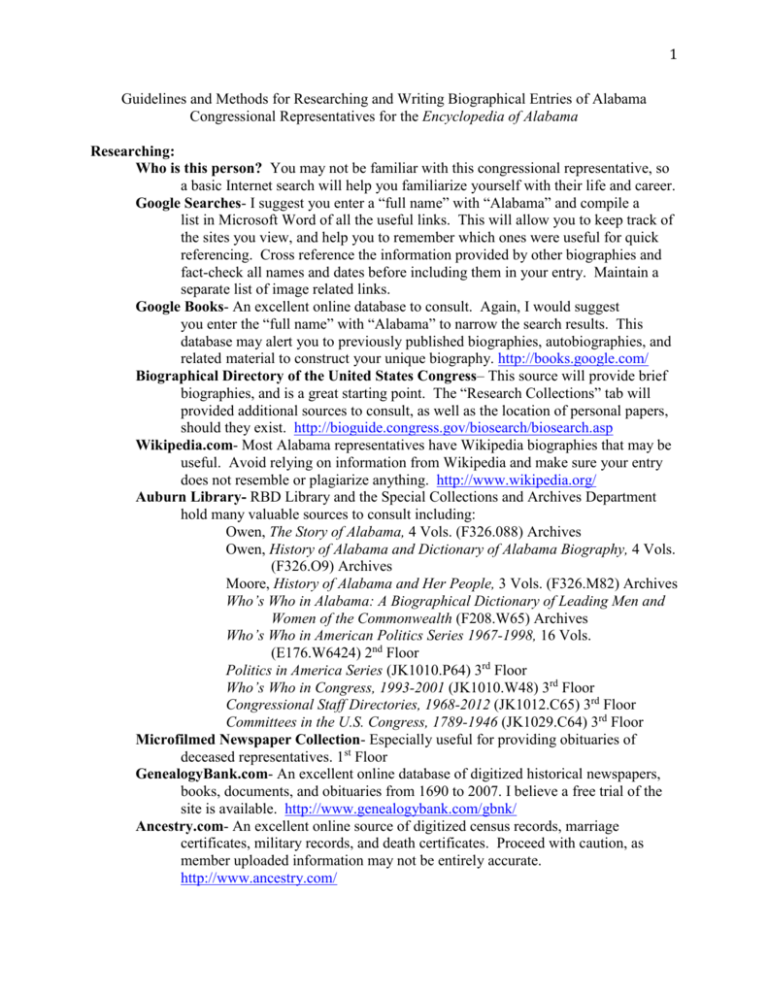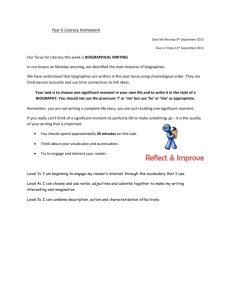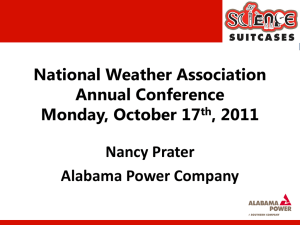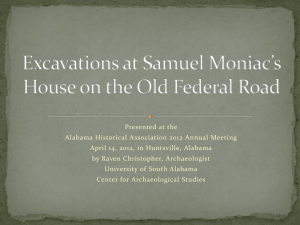EOA Representative Entry Advice
advertisement

1 Guidelines and Methods for Researching and Writing Biographical Entries of Alabama Congressional Representatives for the Encyclopedia of Alabama Researching: Who is this person? You may not be familiar with this congressional representative, so a basic Internet search will help you familiarize yourself with their life and career. Google Searches- I suggest you enter a “full name” with “Alabama” and compile a list in Microsoft Word of all the useful links. This will allow you to keep track of the sites you view, and help you to remember which ones were useful for quick referencing. Cross reference the information provided by other biographies and fact-check all names and dates before including them in your entry. Maintain a separate list of image related links. Google Books- An excellent online database to consult. Again, I would suggest you enter the “full name” with “Alabama” to narrow the search results. This database may alert you to previously published biographies, autobiographies, and related material to construct your unique biography. http://books.google.com/ Biographical Directory of the United States Congress– This source will provide brief biographies, and is a great starting point. The “Research Collections” tab will provided additional sources to consult, as well as the location of personal papers, should they exist. http://bioguide.congress.gov/biosearch/biosearch.asp Wikipedia.com- Most Alabama representatives have Wikipedia biographies that may be useful. Avoid relying on information from Wikipedia and make sure your entry does not resemble or plagiarize anything. http://www.wikipedia.org/ Auburn Library- RBD Library and the Special Collections and Archives Department hold many valuable sources to consult including: Owen, The Story of Alabama, 4 Vols. (F326.088) Archives Owen, History of Alabama and Dictionary of Alabama Biography, 4 Vols. (F326.O9) Archives Moore, History of Alabama and Her People, 3 Vols. (F326.M82) Archives Who’s Who in Alabama: A Biographical Dictionary of Leading Men and Women of the Commonwealth (F208.W65) Archives Who’s Who in American Politics Series 1967-1998, 16 Vols. (E176.W6424) 2nd Floor Politics in America Series (JK1010.P64) 3rd Floor Who’s Who in Congress, 1993-2001 (JK1010.W48) 3rd Floor Congressional Staff Directories, 1968-2012 (JK1012.C65) 3rd Floor Committees in the U.S. Congress, 1789-1946 (JK1029.C64) 3rd Floor Microfilmed Newspaper Collection- Especially useful for providing obituaries of deceased representatives. 1st Floor GenealogyBank.com- An excellent online database of digitized historical newspapers, books, documents, and obituaries from 1690 to 2007. I believe a free trial of the site is available. http://www.genealogybank.com/gbnk/ Ancestry.com- An excellent online source of digitized census records, marriage certificates, military records, and death certificates. Proceed with caution, as member uploaded information may not be entirely accurate. http://www.ancestry.com/ 2 Fold3.com (formerly Footnote.com)- An excellent online source of military records (including service records), especially from the Civil War, WWI, WWII, and Vietnam War. I believe a free trial of the site is available. http://www.fold3.com/ FindAGrave.com- A useful free online database of graves and burial sites. http://www.findagrave.com/ Writing: You should synthesize available information from previous biographies, but more importantly, supplement that information with biographical details from newspapers, personal papers, books, legislative records, congressional reports, and other sources. Your goal should be to compile as many useful facts about the representative’s life and then construct the most concise and complete biography possible. Keep in mind that biographies should begin with an introductory paragraph followed by the beginning, middle, and end of the subject’s life. Your entry should range from 750 to 1,500 words, but consult with the EOA editors if you believe a longer entry might be warranted. Essential Biographical Elements - birthdate, birthplace, parents names and occupations, marriage information, family information (siblings), early education information, college experience (clubs, fraternities, awards, degrees, course of study), business/job experience, military service (dates, assignments, locations, ranks), political experience (local, state, and national), years of congressional service (party, district #, counties/major cities), election results and opponents, committee service (and subcommittees), sponsored legislation, major speeches, awards, honorary degrees, group memberships, post-congressional life, legal matters, retirement date, illnesses, cause of death, place of burial, buildings/streets/scholarships/parks/memorials commemorated in their honor, and other useful/interesting/appropriate information. Brett J. Derbes Auburn University





